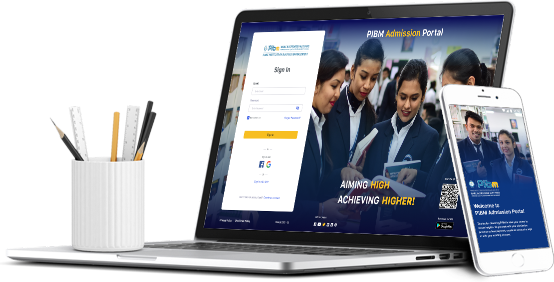PGDM
Beyond the Mainstream Classroom Education
PGDM Program
Pune Institute of Business Management offers a wide range of industry-oriented Post Graduate Business Management programs, which foster a strong business foundation through an experiential learning approach. In addition to equipping students with business management skills and knowledge of the corporate world, the PGDM program also builds their personalities by improving communication, presentation, and information technology skills. The Postgraduate Programs at PIBM are complemented by important Certification Programs that equip students with all the skills and tools necessary to have a successful corporate career.
The flagship PGDM course, for which Pune Institute of Management became a member of AACSB, is a 2-year Residential Business Education Program, making you acquainted with the best practices in Business Management. Moreover, the Association of Indian Universities (AIU) has officially recognized the flagship Post Graduate Diploma in Management (PGDM) program provided by Pune Institute of Business Management (PIBM) as equivalent to a Master in Business Administration (MBA) degree. This momentous accreditation demonstrates PIBM's unwavering commitment to excellence and its dedication to offering top-tier business education. Read the article to the end to learn about PIBM’s PGDM course details.

Member of
AACSB

Recognized by
AIU

The flagship course offered at the PIBM Pune Campus is:
Post Graduate Diploma in Management

Approved by AICTE

Specialization
PIBM’s flagship PGDM course offers the following PGDM specializations:
Marketing
Finance
Human Resource
Applied Business Analytics
Operations (Minor)
Analytics (Minor)
Program Features
PIBM, one of the best colleges for PGDM in Pune, offers a variety of career-enhancing certifications along with extracurricular activities to promote holistic development among the budding business minds. PIBM’s flagship PGDM course offers:

Industry-relevant Curriculum
The industry-co-designed curriculum of PIBM’s flagship PGDM program is updated with advanced training and certifications on industry-relevant tools and business concepts to ensure your employability in top MNCs

Extensive Training & Certification Programs
For various specializations, get trained on the latest tools and industry-needed Certifications that are widely used and valued by MNCs across diverse industries and domains in Finance, Marketing, Analytics & more

Dual Internships & Live Business Projects
Get Dual Benefits of Summer & Winter Internships along with 50+ live business projects in diverse domains and profiles in renowned organizations in various sectors

50+ Presentations each Semester to improve Presentation Skills
Become the master of MS PowerPoint, Google Slides, MS Excel, and key presentation skills with a series of presentations every semester aligned throughout your course tenure

Corporate Connect
Participate in a host of Corporate events throughout the PGDM program and learn from Business Leaders through Business Conclaves, Corporate Events, Industry Visits, & Corporate Mentorship Program

Strong Placement Preparation
Get Aptitude Training with 100+ mock & practice tests, 50+ Mock GD sessions, & 100+ Mock Interviews each semester by Corporate Panelists & Senior Faculty members

Gym, Aerobics, Yoga, Sports & Hobby Development
Develop yourself holistically with our state-of-the-art gymnasium, sports ground, extracurricular activities, clubs & committees, and hobby development activities
Training & Certification
With our extensive list of training and certification programs catered for every specialization, we make sure that you are job-ready from day 1 of your PGDM course enrollment at PIBM.
For Finance
CISI
CPA
NISM
CFA Training
Balance Sheet Analysis
Financial Modeling & Statement Analysis
Bloomberg Terminal
For Marketing
Marketing Analytics
Digital Marketing
Area Sales Management For B2C
Real Estate Sales & Marketing
Banking & Insurance Sales & Marketing
B2C Sales Strategies For FMCG
Digital Marketing Certification - Basic
Digital Marketing Analytics Certification
Content Creation Certification
For Business Analytics
Tableau
R
Python
Channel Analytics
Other Mandatory Certifications
Advanced Excel & MS Project
SAP
SPSS
QlikView
Six Sigma Green Belt
Cognitive & Quantitative Ability Enhancement Certification
Linguistic & Verbal Ability Enhancement Training
Advanced Training on Report Writing Skills
Communication Skills Enhancement Training
Moreover, we also provide Profile-oriented Training for different specializations like: Finance, Marketing & Digital Marketing, Human Resources, Business Analytics & Operations
PGDM Syllabus & Program Structure at PIBM
The 2-Year Business Management program is divided into 4 semesters. PIBM’s PGDM syllabus is provided below.
| Semester | Subject | Type |
|---|---|---|
| SEMESTER I |
|
Common |
| Semester | Subject | Type |
|---|---|---|
| SEMESTER II |
|
Common |
| SEMESTER II |
|
Finance |
| SEMESTER II |
|
Human Resources |
| SEMESTER II |
|
Operations Management |
| SEMESTER II |
|
Marketing |
| SEMESTER II |
|
IT & ITeS Management |
| SEMESTER II |
|
Business Analytics |
| Semester | Subject | Type |
|---|---|---|
| SEMESTER III |
|
Common |
| SEMESTER III |
|
Finance |
| SEMESTER III |
|
Human Resources |
| SEMESTER III |
|
Operations Management |
| SEMESTER III |
|
Marketing |
| SEMESTER III |
|
IT & ITeS Management |
| SEMESTER III |
|
Business Analytics |
| Semester | Subject | Type |
|---|---|---|
| SEMESTER IV |
|
Common |
| SEMESTER IV |
|
Finance |
| SEMESTER IV |
|
Human Resources |
| SEMESTER IV |
|
Operations Management |
| SEMESTER IV |
|
Marketing |
| SEMESTER IV |
|
IT & ITeS Management |
| SEMESTER IV |
|
Business Analytics |
PIBM’s PGDM Eligibility Criteria & Admission Process
Please go through important details before taking admission in our management programs:
Educational Qualification
Applicants must have completed an Indian formal education program under the 10+2+3 or 10+2+4 system.
Minimum aggregate marks required are 50% in 10th, 12th, and the Graduation course.
Selection Process
Candidates will be evaluated based on the following criteria:
Aptitude Test scores of CAT / XAT / MAT / CMAT / ATMA / PMAT (PIBM's aptitude test)
Group Discussion
Personal Interview
Written Test
Additional Weightage
Applicants with relevant work experience will receive additional consideration during the selection process.
Application Fee
Applicants need to send a Demand Draft (DD) of Rs. 1000 drawn in favour of "Pune Institute of Business Management", payable at Pune, for obtaining the prospectus and application form.
Application Methods
Applications can be submitted through:
Online admission portal: https://www.pibm.net
Downloading the application from the Google Play Store.

Profile-oriented Placement Details
Over the years, PIBM has produced amazing Placement Results where students have been placed in super-specialized domains. PIBM students have been offered Top Profiles at various MNCs in diverse domains such as:
Finance
Global Taxation
Equity Advisory & Research
Corporate Finance
Commercial Credit
Fixed Income Securities
Investment Banking
Financial Research Analytics
HR
Employer Branding
Talent Acquisition
Training & Development
HR Business Partner
Performance Management
Labour Laws
HR Analytics
Compensation & Reward Management
Business Analytics
Business Consulting
Business Analysts
Operations
Retail Management
Logistics Management
Process Quality Management
Supply Chain Management
FAQs
PGDM vs MBA: Difference between PGDM and MBA?
MBA and PGDM both are postgraduate management courses, differing in crucial ways. Master of Business Administration (MBA) is a degree program, while Post Graduate Diploma in Management is a diploma program. While the MBA program emphasizes theoretical parts of management, the PGDM degree emphasizes practical and application-based components of management.
What is the course fee for PIBM’s PGDM course?
Click on the PGDM Course Fee button to know more about the course fee of PGDM course at PIBM.
What are the Eligibility Criteria to Apply for PIBM’s PGDM course?
Click on the PGDM Eligibility Criteria button to know in detail about PIBM’s regular PGDM course.
Do PIBM’s PGDM course provide internship opportunities?
Yes, PIBM’s regular PGDM course comes with 2 internship opportunities i.e. the Summer Internship Program and the Winter Internsip Program.
Are there options for Online PGDM courses?
Yes, students can opt for PIBM’s AICTE-approved PGDM Hybrid Program. This course is ideal for working professionals and people having relocating issues.